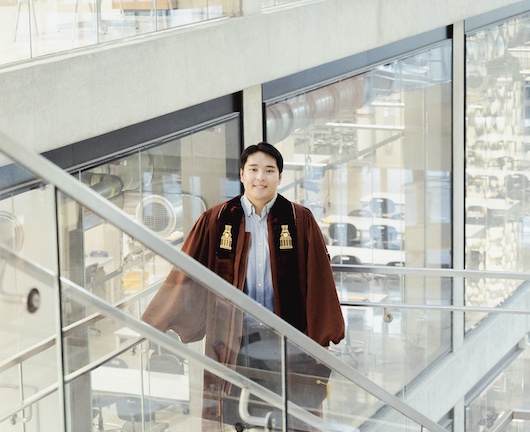
Dr. Yunseong Cho receiving his PhD degree at the Spring 2023 graduation ceremony
For more information contact: Yunseong Cho <yscho@utexas.edu>
This dissertation will be presented to the Faculty of the Graduate School of The University of Texas at Austin in partial fulfillment of the requirements for the degree of Ph.D. in Electrical Engineering
Abstract
Towards Power-Efficient and Intelligent Wireless Communication Systems
Yunseong Cho, Ph.D.E.E.
The University of Texas at Austin, August 2023
Supervisor:
Prof.
Brian L. Evans
Embedded Signal Processing Laboratory - 6G@UT Research Center
With the growing demand for higher data rates and more reliable service capabilities, wireless communication systems continue to grow in popularity and importance. To enable higher data rates via broader bandwidth, millimeter wave (mmWave) systems are deployed for modern and future communication systems. Due to the high transmission loss of the mmWave bands, a massive number of antennas are employed to focus transmitted power in narrow radio frequency (RF) beams. However, associating one RF chain with two high-resolution data converters for each antenna would consume a prohibitively large amount of power. Furthermore, challenging service requirements can be handled by machine learning techniques in a variety of application spaces. The goal of my research is to propose communication systems that are not only reliable and high-performing, but also power-efficient as well as intelligent.
First, I investigate a coordinated beamforming and power control problem for base stations (BSs) with a massive number of antenna arrays with low-resolution analog-to-digital converters (ADCs) and digital-to-analog converters. I first formulate uplink (UL) and downlink (DL) total power minimization problems subject to signal-to-quantization-plue-interference-and-noise ratio (SQINR) constraints. Leveraging strong duality between UL and DL, I propose a framework that discovers the optimal transmit powers in UL by developing an iterative algorithm in a distributed manner and obtains the optimal precoder in DL as a scaled instance of UL combiner.
Second, I aim to find the quantized DL beamformer that minimizes the maximum power on transmit antenna array of each BS under received SQINR constraints while minimizing per-antenna transmit power for a more realistic deployment. By providing strong duality between the quantized DL orthogonal frequency-division multiplexing (OFDM) power minimax problem and its associated dual problem, this framework updates uplink and downlink solutions in an alternating manner with guaranteed convergence. It is shown that the proposed algorithm can scale down both maximum transmit power and peak-to-average-power ratio.
Third, I propose a learning-based maximum likelihood detection framework for uplink systems with one-bit ADCs. Since learning likelihood probability in the high signal-to-noise ratio (SNR) needs excessive training to estimate the extremely small likelihood probabilities, I utilize a dithering signal to artificially decrease the SNR and then remove the impact of the dithering noise via de-noising. I further develop the deep neural network used for SNR estimation and adapt the dithering power according to the observed one-bit patterns. By deriving the log-likelihood ratio as a function of likelihood probabilities, I show that the dithering-based framework can be extended to channel-coded systems.
Fourth, I propose a deep reinforcement learning (DRL)-based solution for joint hybrid beamforming and power control problems when multiple BSs are communicating with multiple users in the uplink mmWave band. To handle the combination of discrete and continuous inputs, I use the deep deterministic policy gradient (DDPG) DRL algorithm, which outputs a valid action that maps to the design factors. In particular, I aim to control each phase shifter individually by introducing an intermediate vector and applying a differentiable argmax function to estimate the phase angle index. The proposed DDPG DRL setup can finally produce digital beamformers, analog beamformers, and transmit powers.
The four contributions could make a worthwhile enhancement to the development of power-efficient and intelligent wireless communication systems by meeting the communication needs of modern society while minimizing energy consumption and maximizing the use of available resources.

Dr. Yunseong Cho receiving his PhD degree at the Spring 2023 graduation ceremony
For more information contact: Yunseong Cho <yscho@utexas.edu>